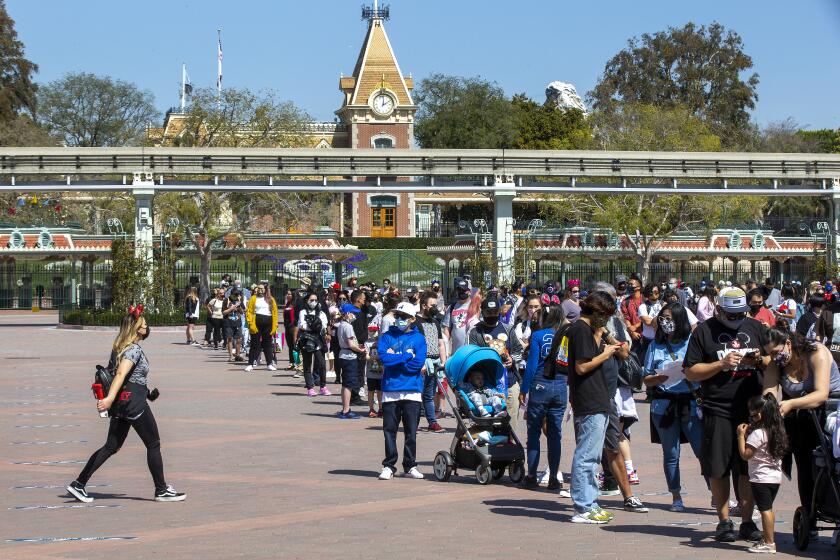South Asia travel picture in flux
The Dec. 26 earthquake and tsunami that struck countries that ring the Indian Ocean, resulting in thousands of deaths, has clouded the picture for travelers, who may be uncertain about plans made or tours purchased months ago.
“We had 36 people scheduled for Bangkok; four people canceled, but 32 got on the plane and went” on Monday, said Marty Seslow, marketing and sales director for Gate 1 Travel, which sells tours to Thailand, among other Asian destinations.
“We have not gotten anywhere near a significant number of cancellations. It could be that people are waiting to sort it out. We even had people calling to make reservations for Thailand.”
That may not be as illogical as it sounds. Bruce McIndoe, chief executive of IJet Travel Risk Management, which assesses problems for companies doing business abroad, said travelers should stay away from affected coastal areas but not necessarily inland regions.
“If you don’t need to travel to the disaster areas, then you should defer travel. But outside of the coastal areas, inland is going to be fine,” he said. “You just need to be prepared for transportation snafus as the countries are dealing with issues.”
He urged travelers to be patient but otherwise said they “should push on” to destinations away from the affected areas.
Some tour operators are having to re-route their clients.
“I have changed plans for some of my clients” with mid-January departures, said Varini de Silva, president and chief executive of Ceylon Express International, which operates tours to Sri Lanka and other South Asian countries, including India and the Maldives.
“It was an emotional decision. It’s a sad place to be right now.”
The disaster has prompted State Department announcements about travel to several South Asian countries. Among them, as of the Travel section’s deadline Tuesday:
Indonesia: In a posting early last week, the department urged Americans to defer nonessential travel to Indonesia, whose own government has declared it a disaster area. The country also was the subject of a State Department travel warning issued more than a week before the quake that emphasized the terrorist threat as a reason to avoid travel there. Bali, popular with Western tourists, apparently was not affected by the quake or tsunami because of its location.
Thailand: The State Department’s posting urged U.S. citizens to “avoid travel to the southwestern area of Thailand encompassing Phuket, Phi Phi Island, Krabi and the small islands in the vicinity.”
Sri Lanka and the Maldives: U.S. citizens are urged “to avoid travel to Sri Lanka and the Maldives.” News reports have described the devastation on Sri Lanka as apocalyptic.
For updates, see https://www.travel.state.gov .
*
Resources
for travelers
For information from the U.S. State Department on affected countries, call (888) 407-4747 toll-free in the U.S. and Canada. From overseas, call (317) 472-2328.If you’re considering travel to any of the affected areas, you also can check with these agencies and websites. As of the Travel section’s deadline Tuesday, not all sites had been updated.
India: Government of India Tourist Office, (213) 380-8855, https://www.incredibleindia.org .
Sri Lanka: Embassy of Sri Lanka, (202) 483-4025, https://www.slembassyusa.org .
Indonesia: Indonesian Consulate General, at (213) 383-5126 or https://www.embassyofindonesia.org . Also see https://www.usembassyjakarta.org .
Thailand: Tourism Authority of Thailand, (323) 461-9814 or https://www.tourismthailand.org . Also see https://www.mfa.go.th .
Myanmar: Embassy of Myanmar, (202) 332-9045 or https://www.myanmar.com .
Maldives: Go to https://www.visitmaldives.com .
Malaysia: Tourism Malaysia, (213) 689-9702 or https://www.tourism.gov.my .
*
Keeping an eye on illnesses
Despite the growing concern about disease in parts of Asia devastated by a catastrophic tsunami, the World Health Organization says any epidemics are unlikely to spread beyond hard-hit coastal regions.“This is only in the affected area,” said Dr. Dana Van Alphen, disaster advisor for WHO’s regional office for the Americas, in Washington. She said travelers should be concerned only if they are bound for places where clean water for drinking and bathing is in short supply. Otherwise, she said, “I wouldn’t worry.”
The WHO website, https://www.who.int , carries country-by-country updates on the places affected by the tsunami and the health dangers associated with its fallout, including respiratory infections and diarrheal diseases.
Van Alphen also advised Asia-bound tourists to consult the travelers’ health section of the national Centers for Disease Control and Prevention’s website, https://www.cdc.gov . Although no tsunami-related information had been posted as of the Travel section’s deadline Tuesday, the site does include warnings about disease outbreaks worldwide and information about cholera, dengue fever, malaria and other travel-health concerns.
If a tour
is canceled
As the situation develops, some tours will undoubtedly be affected.“As with 9/11 or with any major disaster, each operator has their own individual policy” about trip adjustments, said Bob Whitley, president of the U.S. Tour Operators Assn., which consists of 138 tour operator “brands” and moves about 10 million people a year.
Some of the operators “will offer credit, some will give refunds,” he said. “It’s important to look at the cancellation policies. Something like this clearly is force majeure. Tour operators will do the best they can.”
If you encounter problems, contact the travel agent who sold you the package, he said. If that doesn’t work, contact the association at information @ustoa.com. Also see the website at https://www.ustoa.com .
— Times staff
Sign up for The Wild
We’ll help you find the best places to hike, bike and run, as well as the perfect silent spots for meditation and yoga.
You may occasionally receive promotional content from the Los Angeles Times.



